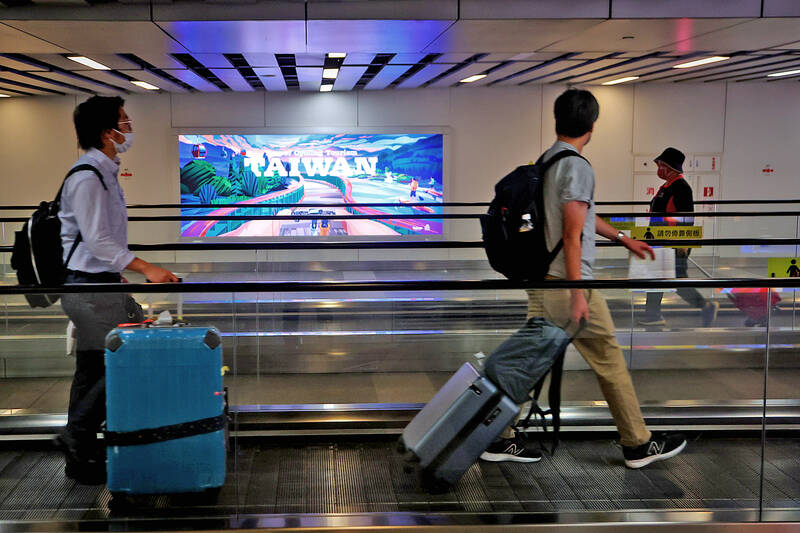The government has reduced the proportion of runaway Southeast Asian tourists from group tours to nine in 10,000 by better managing which travel agencies are used, the Tourism Administration said.
The Project for Simplifying Visa Regulations for High-end Group Tourists from Southeast Asian Countries, also known as the Kuan Hung Pilot Project (觀宏專案), was launched in 2015 to attract tourists from Cambodia, India, Indonesia, Laos, Myanmar and Vietnam in line with the government’s New Southbound Policy.
Tourists from these countries can visit Taiwan on an electronic visa, which they obtain by participating in group tours organized by travel agencies designated by the Tourism Administration.

Photo: CNA
Some human resource agencies were reported to have abused loopholes in the project to bring in cheap workers from overseas.
In December 2018, 152 Vietnamese were reported missing after their tour groups arrived in Taiwan, making them the largest batch of runaways since the project’s implementation.
The Chinese-language United Daily News published a report on Sunday saying that from Nov. 11, 2022, to last month, 68 Southeast Asians who had arrived in Taiwan through the pilot project had left their tour groups without authorization.
Of those missing, 60 were from Vietnam, the report said.
The administration defended the project in a statement, saying that since 2019 it has limited the number of runaways to nine in 10,000 by changing the regulations to improve the management of tours.
The number is far lower than the three in 1,000 recorded in 2015, it said.
The number was still nine in 10,000 from Nov.1, 2022, to April 30, and did not rise despite an increase in tourists after the COVID-19 pandemic, the administration added.
Overseas travel agencies designated by the administration to organize tours to Taiwan must be recommended by the administration’s office in that country and tourism officials in other countries, the administration said, adding that it must also approve them.
The list is subject to periodic review by the administration, and travel agencies that operate abnormally or fail to effectively attract tourists to Taiwan are removed from the list, it said.
“We will also ask for more information when meeting with tourism operators at the Taiwan-Vietnam Tourism Cooperation Conference,” the administration added.
The administration must secure approval from the Executive Yuan every year to continue the project.
Regulations are now clearer than last year for overseas travel agencies that organize tours, as well as for Taiwanese travel agencies that host the groups when they arrive, it said, adding that their right to arrange tours would be suspended or terminated if they contravene the regulations.
The National Immigration Agency (NIA) is responsible for pursuing foreigners who have absconded, the administration said.
“If tourists leave the tour groups without authorization, Taiwanese travel agencies are obligated to report the incident to the NIA.” it said.
With the number of middle-class Southeast Asians rising, Japan, South Korea and other countries have streamlined their visa application procedures to attract tourists from the region, it added.
From Nov.11, 2022, to April 30, about 74,000 group travelers visited Taiwan through the project, it added.

Chinese Nationalist Party (KMT) Chairman Eric Chu (朱立倫), spokeswoman Yang Chih-yu (楊智伃) and Legislator Hsieh Lung-chieh (謝龍介) would be summoned by police for questioning for leading an illegal assembly on Thursday evening last week, Minister of the Interior Liu Shyh-fang (劉世芳) said today. The three KMT officials led an assembly outside the Taipei City Prosecutors’ Office, a restricted area where public assembly is not allowed, protesting the questioning of several KMT staff and searches of KMT headquarters and offices in a recall petition forgery case. Chu, Yang and Hsieh are all suspected of contravening the Assembly and Parade Act (集會遊行法) by holding

PRAISE: Japanese visitor Takashi Kubota said the Taiwanese temple architecture images showcased in the AI Art Gallery were the most impressive displays he saw Taiwan does not have an official pavilion at the World Expo in Osaka, Japan, because of its diplomatic predicament, but the government-backed Tech World pavilion is drawing interest with its unique recreations of works by Taiwanese artists. The pavilion features an artificial intelligence (AI)-based art gallery showcasing works of famous Taiwanese artists from the Japanese colonial period using innovative technologies. Among its main simulated displays are Eastern gouache paintings by Chen Chin (陳進), Lin Yu-shan (林玉山) and Kuo Hsueh-hu (郭雪湖), who were the three young Taiwanese painters selected for the East Asian Painting exhibition in 1927. Gouache is a water-based

Taiwan would welcome the return of Honduras as a diplomatic ally if its next president decides to make such a move, Minister of Foreign Affairs Lin Chia-lung (林佳龍) said yesterday. “Of course, we would welcome Honduras if they want to restore diplomatic ties with Taiwan after their elections,” Lin said at a meeting of the legislature’s Foreign Affairs and National Defense Committee, when asked to comment on statements made by two of the three Honduran presidential candidates during the presidential campaign in the Central American country. Taiwan is paying close attention to the region as a whole in the wake of a

OFF-TARGET: More than 30,000 participants were expected to take part in the Games next month, but only 6,550 foreign and 19,400 Taiwanese athletes have registered Taipei city councilors yesterday blasted the organizers of next month’s World Masters Games over sudden timetable and venue changes, which they said have caused thousands of participants to back out of the international sporting event, among other organizational issues. They also cited visa delays and political interference by China as reasons many foreign athletes are requesting refunds for the event, to be held from May 17 to 30. Jointly organized by the Taipei and New Taipei City governments, the games have been rocked by numerous controversies since preparations began in 2020. Taipei City Councilor Lin Yen-feng (林延鳳) said yesterday that new measures by